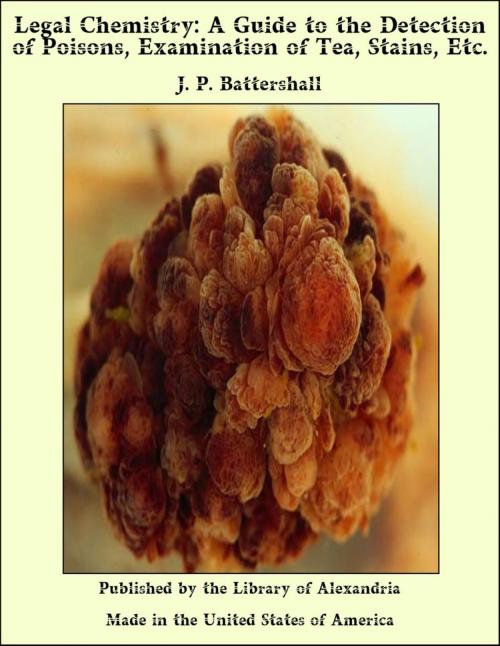Legal Chemistry: A Guide to the Detection of Poisons, Examination of Tea, Stains, Etc.
Nonfiction, Religion & Spirituality, New Age, History, Fiction & Literature| Author: | J. P. Battershall | ISBN: | 9781465588968 |
| Publisher: | Library of Alexandria | Publication: | March 8, 2015 |
| Imprint: | Language: | English |
| Author: | J. P. Battershall |
| ISBN: | 9781465588968 |
| Publisher: | Library of Alexandria |
| Publication: | March 8, 2015 |
| Imprint: | |
| Language: | English |
The term Legal Chemistry is applied to that branch of the science which has for its office the solution of problems proposed in the interest of Justice. These most frequently relate to cases of poisoning. When the subject of the symptoms or anatomical lesions produced by the reception of a poison is under consideration, the services of a medical expert are resorted to; but when the presence or absence of a poison in the organs of a body, in the egestaof an invalid or elsewhere is to be demonstrated, recourse is had to the legal chemist. Investigations of this character require great practice in manipulation, and, however well the methods of analysis may be described in the works on the subject, there would be great danger of committing errors were the examination executed by an inexperienced person. The detection of poisons, although perhaps the most important, is not the only subject that may come within the province of the legal chemist; indeed, it would be somewhat difficult to define, a priori, the multitude of questions that might arise. In addition to cases of supposed poisoning, the following researches are most often required: 1. The examination of fire-arms. 2. The analysis of ashes, in cases where the destruction of a human body is suspected. 3. The detection of alteration of writings, and of falsification of coins and precious alloys. 4. The analysis of alimentary substances. 5. The examination of stains produced by blood and by the spermatic fluid. The importance of exact chemical analysis in a great variety of cases which come before the courts is now fully recognized, and the translation of this excellent little book on Legal Chemistry, by one of the most distinguished French Chemists, will be appreciated by a large class of American readers who are not able to consult the original. While it is to be regretted that the author has not presented a much more complete work, there is an advantage in the compact form of this treatise which compensates, in some degree, for its brevity. The translator has greatly increased the value of the book by a few additions and his copious index, and especially by the lists of works and memoirs which he has appended; and while he could have further increased its value by additions from other authors, we recognize the weight of the considerations which induced him to present it in the form given to it by the author. Some chapters will have very little value in this country at this day, but the translator could not, with propriety, omit anything contained in the original.
The term Legal Chemistry is applied to that branch of the science which has for its office the solution of problems proposed in the interest of Justice. These most frequently relate to cases of poisoning. When the subject of the symptoms or anatomical lesions produced by the reception of a poison is under consideration, the services of a medical expert are resorted to; but when the presence or absence of a poison in the organs of a body, in the egestaof an invalid or elsewhere is to be demonstrated, recourse is had to the legal chemist. Investigations of this character require great practice in manipulation, and, however well the methods of analysis may be described in the works on the subject, there would be great danger of committing errors were the examination executed by an inexperienced person. The detection of poisons, although perhaps the most important, is not the only subject that may come within the province of the legal chemist; indeed, it would be somewhat difficult to define, a priori, the multitude of questions that might arise. In addition to cases of supposed poisoning, the following researches are most often required: 1. The examination of fire-arms. 2. The analysis of ashes, in cases where the destruction of a human body is suspected. 3. The detection of alteration of writings, and of falsification of coins and precious alloys. 4. The analysis of alimentary substances. 5. The examination of stains produced by blood and by the spermatic fluid. The importance of exact chemical analysis in a great variety of cases which come before the courts is now fully recognized, and the translation of this excellent little book on Legal Chemistry, by one of the most distinguished French Chemists, will be appreciated by a large class of American readers who are not able to consult the original. While it is to be regretted that the author has not presented a much more complete work, there is an advantage in the compact form of this treatise which compensates, in some degree, for its brevity. The translator has greatly increased the value of the book by a few additions and his copious index, and especially by the lists of works and memoirs which he has appended; and while he could have further increased its value by additions from other authors, we recognize the weight of the considerations which induced him to present it in the form given to it by the author. Some chapters will have very little value in this country at this day, but the translator could not, with propriety, omit anything contained in the original.















